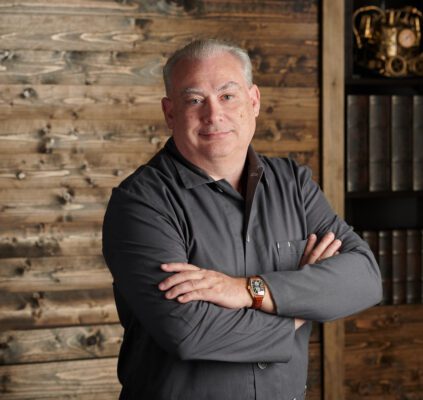Name: David Skinner
Location: Kemah, TX
Education/background: Bacehlor of Science in Finance, Bachelor of Science in Economics, Masters of Business Administration in Finance
Business name: Eculent, th_prsrv (The Preserve)
Tribal affiliation: Choctaw

What led to your passion for indigenous foods?
I grew up in Ponca City, OK, and both sides of my family loved to cook. We always had gardens and would pick and can all spring and summer. I remember my great-grandmother telling Choctaw stories as she cooked for us. The food was wonderful, and the stories made the food even better. At a young age I wanted to be a chef and my grandmother encouraged it and would teach me her secrets to cooking. At 16 I opened my first restaurant with the help of my grandmother. It is still some of my best memories.
I went to Oklahoma State and studied business at the insistence of my mother. When I graduated, I decided to work for Conoco and then had a series of entrepreneurial ventures. In 2014 I opened eculent, my avant-garde 30 course tasting menu restaurant in Kemah, TX. I started developing courses based on my grandmother and great-grandmother’s recipes. The surprise to me was these Choctaw recipes were some of the most popular. This led me to thinking about opening an indigenous only restaurant, which I did with a friend and James Beard winning Thai chef. The new restaurant is called th_prsrv (The Preserve) and is Choctaw and Thai, but not fusion. The menu is historical and laid out as a timeline starting with the first courses beginning around 2500BCE and finishing with present day courses.
Why do you think it’s important to make traditional foods accessible for Native people?
The preservation and accessibility of traditional foods for Native communities is important for our cultural, health, economic, and social viability. Because of the impacts from early colonization and segregation, and recent processed food availability, much of our heritage — including native foods and preparation methods – has been forgotten. Food is an integral part of every culture and for Native communities is deeply tied to our traditions, history, and identity. Traditional foods are not just sustenance but are deeply symbolic and help to preserve our cultural heritage and customs. It is vitally important to bring back traditional foods and cooking techniques to ensure future generations understand our past.
What is the importance of an indigenous diet for a healthy lifestyle?
An Indigenous diet can offer significant advantages when it comes to promoting a healthy lifestyle. As a country we have an obesity problem which is caused primarily by processed foods. If we go back to a true indigenous diet using healthy heritage products, we can reverse this trend and increase our longevity and improve our overall lifestyle. Also, Indigenous methods of food production and gathering are more sustainable and more in tune with local ecosystems.
What ways are you involved in the education, restoration and accessibility of traditional Native foods?
Through my restaurant th_prsrv, we educate our guests each night on the history of the Choctaw people, their culture, traditions, food and cooking techniques. I have spent several years researching long-forgotten recipes and techniques to make them accessible to my guests. We also purchase the bulk of our ingredients from indigenous communities and producers. My goal is to reeducate people so that they don’t think Native American food is just fry bread and Indian Tacos.
How can community members be involved and support the cause of restoring and protecting indigenous food systems?
The restoration and protection of Indigenous food systems is a multi-faceted endeavor but there are several things I believe can make significant impacts.
First by documenting oral history, recipes, and techniques we can ensure future generations do not lose the wisdom of the past. Teaching and learning traditional methods of farming, hunting, and food preparation can keep these practices alive. Our Elders possess rich knowledge and want to share it. I still remember many stories from my great-grandmother. I only wish I had written more of them rather than relying on memory.
Second, I think creating community gardens that focus on indigenous plants and traditional farming methods can serve as both an educational tool and a food source. I am also involved in seed preservation of heritage breeds. There is too much manipulation of seed stocks for productivity while losing nutritional value and taste.
Lastly, establishing and supporting Native food markets can make these Indigenous foods more accessible and can support local farmers and hunters.
